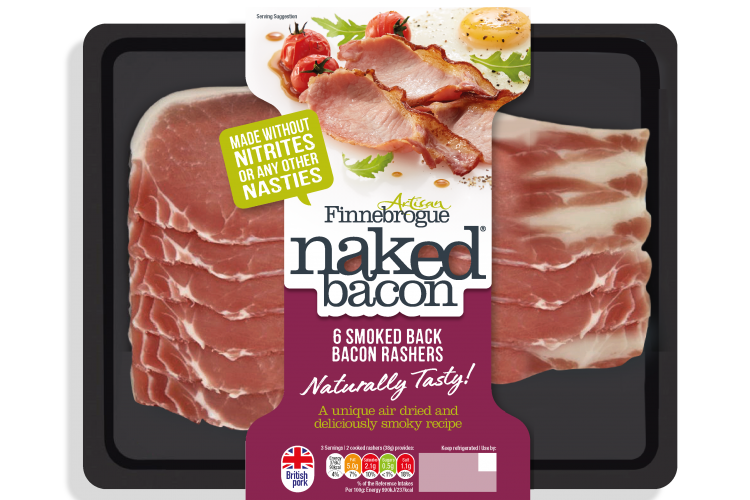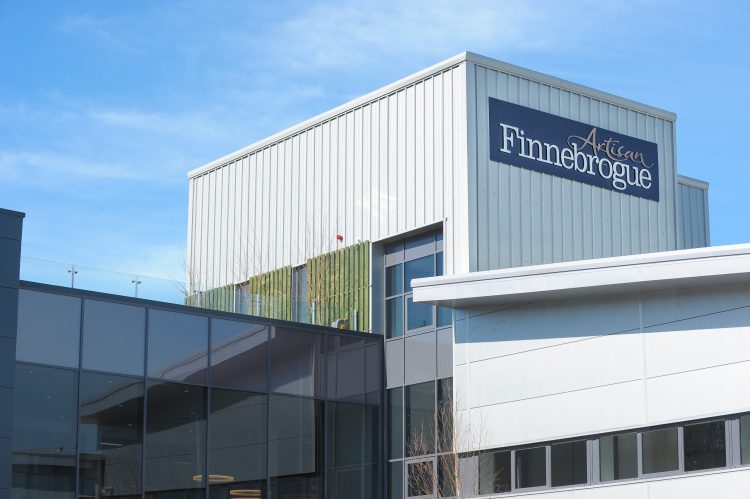Nitrite-free bacon: making the dream a reality at Finnebrogue Artisan
- Like
- Digg
- Del
- Tumblr
- VKontakte
- Buffer
- Love This
- Odnoklassniki
- Meneame
- Blogger
- Amazon
- Yahoo Mail
- Gmail
- AOL
- Newsvine
- HackerNews
- Evernote
- MySpace
- Mail.ru
- Viadeo
- Line
- Comments
- Yummly
- SMS
- Viber
- Telegram
- Subscribe
- Skype
- Facebook Messenger
- Kakao
- LiveJournal
- Yammer
- Edgar
- Fintel
- Mix
- Instapaper
- Copy Link
Posted: 12 April 2019 | Denis Lynn (Finnebrogue Artisan) | No comments yet
From selling a new type of chip to raising the bar in venison farming and pinning down the formula for nitrite-free bacon, Denis Lynn of Finnebrogue Artisan has always aimed to do things differently. Here, he charts his trajectory through the food sector and explains why he feels so passionately about his latest venture.


Bacon is a British institution. Ham is eaten and loved the world over. But these delicious processed meats come with a significant risk to our health. Nitrites are used to cure the meat, to keep it pink and to preserve it so it can stay on the supermarket shelves for longer. However, when nitrite-cured meat is cooked and ingested, it produces carcinogenic nitrosamines in the stomach. In 2015, a major report from the World Health Organization linked 34,000 worldwide cases of colorectal cancer a year to diets high in processed meats1 – a report that prompted me, a sausage maker from Northern Ireland, to seek out a solution.
How it all started
My career in the food sector began back in 1985 with Lynn’s Country Foods. I started the company not because I had any desire to work for myself, or because it was business that I had always dreamed of working in. My reasons were less romantic: I had no job and a mortgage, and I didn’t want to sign on at the local dole office. So, with the help of the bank, I bought a second-hand car and began buying pizzas and pies from a small manufacturer in Comber, Northern Ireland and selling them to shops and restaurants. I worked hard and within a few months I bought a little white van (not refrigerated, but at least it was white) and had hired my first employee.
I eventually worked out that the best type of business to be in was one where I could maximise both volume and margin at the same time. These two things don’t typically go hand in hand, particularly in a low margin area such as food. I believed that the only way to achieve this was through making a better product than anything else that was available. Things really took off when I discovered a new type of French fry: Lord Chips.
Partially cooked in the factory and then chilled at 2°C, they cooked in 90 seconds in the restaurant – far more quickly than frozen – but they tasted like fresh chips and weren’t hollow like the frozen variety. We quickly became Lord’s largest customer in Europe and got the agency for the whole of Ireland.
Love at first sight
Having made some money through chips and distribution I bought the stunning Finnebrogue Estate in Downpatrick, Northern Ireland in 1991 – I just fell in love with the land. In 1993, I sold the distribution and chip side of the business to O’Kanes Poultry, having decided to retire from business and try my hand at beef farming. Once I’d figured out how to farm beef cattle, I became concerned at the level of subsidies being paid to farmers by the EU and felt that I would rather be in a real-market situation and a controller of my own destiny. So, in 1996, we sold every single cow, fenced the entire estate and overnight became the largest deer farm in the UK and Ireland. I was also listening to friends, family and the general public struggling to come to terms with the impact of BSE and saw an opportunity to provide healthier meat. Finnebrogue Artisan was born.
Point of difference: no nitrites
I began selling to top end restaurants around Ireland at first. As ever, it was important for me to offer something different and superior to anything else available.
I became concerned at the level of subsidies being paid to farmers by the EU and felt that I would rather be in a real-market situation and a controller of my own destiny.
The restaurant trade was full of poor quality and inconsistent wild venison and there was a real opportunity for something that gave more chefs more confidence that the quality would consistent. On a personal level, I believe that animals deserve as good a life as possible and that, as a farmer, it is my responsibility to make sure this happens – and to communicate it’s happened to our customers. I then began by looking at factors that influence meat quality and it became clear that the age of the animal and control of stress would be critical to delivering a consistently great product. Once I had these things sorted, the product was quickly snapped up by retailers and restaurant owners, from Marks and Spencer and Raymond Blanc to Gordon Ramsay and Heston Blumenthal.
To make sure I could deliver this quality consistently, repeatedly and at a scale, we custom-built a processing plant to supply M&S. Once this model proved successful, we set out to do the same for sausages, burgers, stuffings and other products. Today I believe our pork sausages are the finest anywhere in the UK, delivering unbeatable growth in Marks and Spencer and to the Asda Extra Special ranges that we supply. Our wagyu beef, vegetarian and other food products are all of the highest quality, produced in one of our three state-of-the-art factories in County Down, which includes the £25 million food processing plant opened on the Finnebrogue estate back in 2016. Our commitment to quality has been the cornerstone of our phenomenal growth from just a £5m turnover in 2009 into a £100m family-owned food business today, employing over 500 people.


The company invested £17million in a state-of-the-art production facility, which opened earlier this year
In making sausages for many of the UK’s major supermarkets, it always made sense for us to make bacon and ham as well. But I refused to make a single rasher or slice until we could find a way to do it without nitrites. I was not going to add chemicals that had been linked to cancer to any food that I produced. My team travelled the world looking for an alternative to nitrite. For years, we were sent up blind alleys, wooed by people claiming to have an answer to the nitrites conundrum, only to later find that, for instance, they were simply adding celery juice or other natural sources of nitrites to their meat to cure it. The science says that, whatever the source of nitrite – whether from sodium nitrite (salt), potassium nitrite (salt peter) or nitrites derived from vegetable extracts – it will still produce nitrosamines when cooked and ingested and still increase the risk of cancer. Indeed, using vegetable-extract nitrites to cure meat is even banned under EU law.
Finally, after many years of searching, we came across Spanish chemist, Juan de Dios Hernandez. As chief executive of ingredients solutions company Prosur, he has made it his life’s work to take artificial additives out of food and replace them with safe, natural alternatives. Through his work he had come across a blend of Mediterranean fruit and spice extracts that turned pork pink – traditionally recognised as a sure sign of nitrite contamination. But on closer inspection there were no nitrites to be found – just natural whole fruit extracts, high in antioxidants, which have all the positive effects of nitrites, but without the carcinogenic risk. We launched the first mass-produced nitrite-free bacon brand in the UK using this ground breaking technology – opening a £17million factory dedicated to its production earlier this year – and it has been a phenomenal success.
I want to remove nitrites from all processed meats in the UK within the next three years – and I am willing to share our technology to achieve this ultimate goal.
In the 15 months since our launch, Naked Bacon has established itself as the second biggest bacon brand in the country – annualising £15m in retail sales. It has provided consumers with a safer nitrite-free and readily available alternative for the first time – and it has brought tens of thousands of people back to eating bacon who had previously given it up because of the nitrites risk. There is a huge demand for additive-free food and, as the salience of the nitrites issue rises, demand for these safer alternatives rises, too. It isn’t just the World Health Organization that has pointed to the risks. Decades’ worth of research has demonstrated why nitrites should not be added to meat. As far back as the 1970s, for instance, Dr William Lijinsky, a biochemist and laboratory director at the in the US, said studies with rats provided overwhelming and compelling evidence that nitrosamines were carcinogenic for humans.2 The wealth of available evidence has prompted some significant action in the first quarter of 2019. A coalition of cross-party politicians joined leading food scientists and medical professionals in calling on the food industry to remove nitrites from processed meats – and pressuring government to intervene if no action is taken.3 This group was led by Professor Chris Elliott, chair of the Institute of Global Food Security at Queen’s University in Belfast and the scientist who led the investigation into the horse meat scandal in 2013. Other signatories included the deputy leader of the Labour Party, Tom Watson MP, two former shadow environment secretaries, a Conservative MP and MEP, a Liberal Democrat peer and a leading NHS and Harley Street cardiologist.
The next step
The question for policy makers, my colleagues in the food industry and for me is, what now?
My answer is clear. I want to remove nitrites from all processed meats in the UK within the next three years – and I am willing to share our technology to achieve this ultimate goal. My priority is not to become Britain’s biggest bacon manufacturer, but simply to rid these needless chemicals from our processed meats and to cut the cancer risk from those Sunday morning fry-ups so many of us love.
Nitrites are no longer needed to flavour our bacon, to preserve our bacon or to keep it pink, so why would we use them? The food industry must decide what it wants to do.
My hope is that the UK processed meat industry will seize the golden opportunity that preservation without nitrates offers to lower the rates of bowel cancer in the UK, reduce the strain on our National Health Service and prove that we produce some of the finest, safest food anywhere in the world. We have the chance to be on the right side of history – and to deliver a huge success story for the British food industry that would prompt our friends around the world to also make this positive change. I am clear in my mind that if we do not act, history will not look kindly on us – and consumer pressure will eventually force the Government to intervene instead.
About the author
Denis Lynn is Chairman of Finnebrogue Artisan, a company he founded in 1985. Today employing 470 people and with an annual turnover of £75 million, Finnebrogue has made its name as a leading supplier of top-tier sausages, bacon and venison.
References
- https://www.who.int/features/qa/ cancer-red-meat/en/
- https://www.nature.com/ articles/239165b
- https://www.theguardian.com/ food/2018/dec/29/nitrites-u sed-in-bacon-cured-meats-linked -to-cancer-experts-warn
Issue
Related topics
Food Safety, Health & Nutrition, Natural, Technology & Innovation
Related organisations
Finnebrogue Artisan, Lynn’s Country Foods, Marks & Spencer, National Cancer Institute, Prosur, World Health Organization (WHO)









